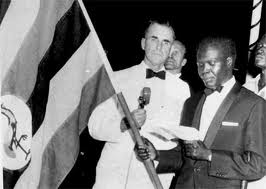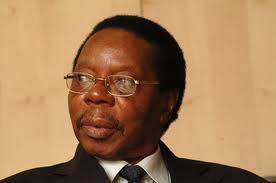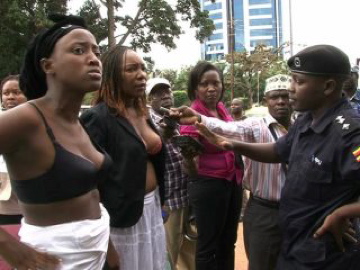As countries go, Uganda, with its 50 years of formal independence this year is but a little sprout. But there is a mega party worthy of a big forest on 9th October to toast to this achievement. On the radio, busy bodies, are talking up the significance of the big golden jubilee. They are asking everyone, men, women and children, religious leaders to join. It will be a multi-stakeholder party it is whispered as emails fly back and forth on the importance of being Ugandan, feeling Ugandan and celebrating this fact in style. Big themes are something that we “Africans” love so expect lots of drums, ostrich feathers, whistles and bells. There will also be a lot of meat. And speeches. ( above Apollo Milton Obote receiving the Uganda flag in 1962)
And so it was this week when the long-suffering composer of the Ugandan national anthem passed on. Many raised their hands in protest at how he had been ignored by the government. Bury him a hero they demanded. “ Oh Uganda, the land of freedom” should not stop at the first stanza suggested others. Sing the entire three stanzas, to show your patriotism. During his funeral on Saturday the President of Uganda was a chief mourner. In Africa, depending on the occasion, a funeral can be a celebration where drums are beat and cows slaughtered. George Kakoma who composed the Uganda national anthem in what was the colonial version of “Tusker project fame”, a writing competition, was hailed as a hero of independence. One cannot take away from the man his achievements but their exaggerated meaning is not something to puzzle over.
 African leaders many of who legitimately fought colonialism have kept all the White Man’s traditions and regalia. Despite all the rhetoric about freedom there was no new concept the colonial infrastructure of the state was retained wholesale. Perhaps it saved post-colonial leaders and those who aspire the freedom to think. It is this face of the state as a concept best appraised by the White Man’s standards that irk and bother African commentators whenever the continent is judged by the standards it willingly committed to. So at the death of Mr. Kakoma there was no critical appraisal of his three stanzas or what sort of state it praised. In a few days many Africans will rub their sweating palms together when the British Broadcasting service (BBC) conducts yet another debate here in Kampala about Africa’s “international image” and whether it is “justified” or “Prejudice-d”.
African leaders many of who legitimately fought colonialism have kept all the White Man’s traditions and regalia. Despite all the rhetoric about freedom there was no new concept the colonial infrastructure of the state was retained wholesale. Perhaps it saved post-colonial leaders and those who aspire the freedom to think. It is this face of the state as a concept best appraised by the White Man’s standards that irk and bother African commentators whenever the continent is judged by the standards it willingly committed to. So at the death of Mr. Kakoma there was no critical appraisal of his three stanzas or what sort of state it praised. In a few days many Africans will rub their sweating palms together when the British Broadcasting service (BBC) conducts yet another debate here in Kampala about Africa’s “international image” and whether it is “justified” or “Prejudice-d”.
More wary ones are advised to stay away from such a debate, turn on a premiership football match and open a beer because it simply reinforces what it claims to interrogate. The debate has no weighing the subject as a question of fact. It will stagnate on the merry-go-round of perceptions about the continent. This by itself however is not new.
But on what basis does one base a good reputation? There is no such thing really as a bad image that can’t be repaired. After we get over “Africa is not one country” but often thought of as one, we will soon forget the Rwanda’s, Botswana’s and South Africa’s of this former colonial playground. What is really problematic about African countries pretending to be states and African statesmen and strongmen posturing to African unity is how much they are cheered on and why.
To answer the BBC, it is possible that what conspires to explain Africa’s condition is the hyperbole that this conversation is. If I may, Africa as a country, that popular version, is explained by the coupling of foreign aid and bad governments, a marriage of convenience, of partners that need each other but publicly quarrel about their union. Foreign aid (as opposed to investment which is now becoming vogue) has been the advertising agent of the popular version of Africa. Its giant billboards dominate magazines, newspapers and conferences with hunger, death and civil wars. At home political fat cats have lapped at its milky gravy trail.
All they are required to do is pretend to do reform, fail at it, and then hold a conference about what the real problem is. This conspiracy of bad government, bad governance, the aid industry and western foreign policy that rests on the post-colonial mindset that abuses of the past must be met with reluctant charity today explains Africa’s bad image. Not surprisingly most scholarship on Africa’s development is about aid programs, their success or failure. Even the slogan of “aid not trade” is about charity. Once in a while the shows like CNN’s Heroes will pick some fresh positive storylines from this situation but it is supported by the contrast they draw and also informs that contrast. African countries like painted corpses are praised on the one hand while the stench fills the air. Recently advocates of African renaissance have looked to growing cities, markets and China. So Africa’s minerals and markets will shape its future perception. Yet again a conspiracy of bad government, bad governance and foreign investment will determine how badly the painted corpse smells. Foreign investment that targets only natural resources is not different from foreign aid. Its language of change will be hailed by the same actors but am afraid the real path for change of rethinking Africa remains ahead.










